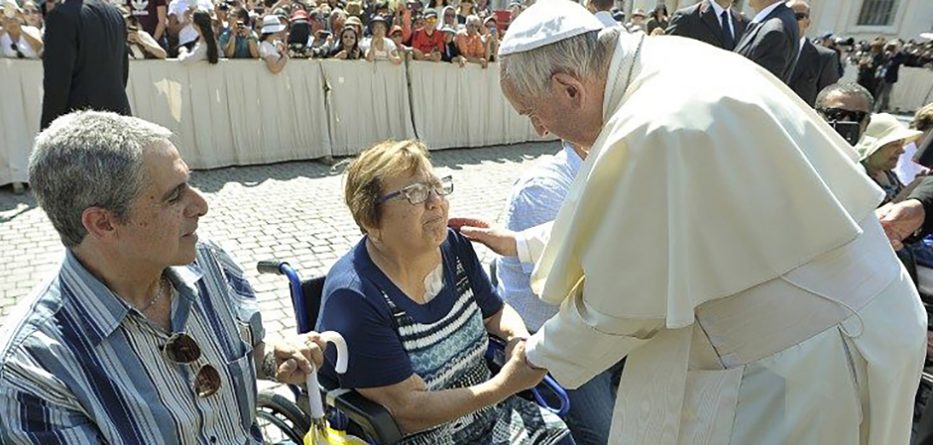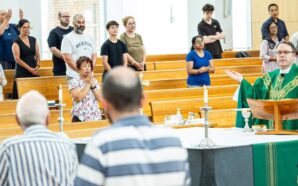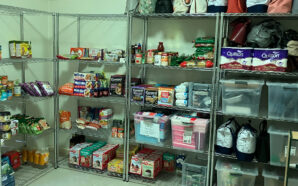As a young man, I was in a supermarket with my family on one occasion. A very concerned lady came up to my parents and said what a shame it was that the poor boy was blind. “What does he do all day?” she asked. “He practices law,” I answered.
We in the Church have, unfortunately, often been in that position, unwilling to recognize the lives of disabled members as exactly that – the lives of equal children of God, laboring together according to a multitude of gifts and talents in the vineyard of the Lord. There is still widespread discrimination with regard to the disabled within the Church. Buildings are often inaccessible, documents are not accessible to them and assumptions often do not reflect the lived reality of disability. When applying to join the Jesuits, for example, I was initially told that I should look for a less academic order. It was only when I informed the vocations promoter that I was completing a PhD (completed the year I joined) that I was allowed to proceed. And yet disabled people are supported by, and support, networks and communities. We too are Church.[1]
I have the great privilege of living, not only within a parish but also a supportive religious community – the Society of Jesus. At the same time, both before joining religious life and now, I have been supported by my family, friends and the broader community who have not only met my basic physical needs but also provided companionship, supported growth in the faith and offered wise counsel.
As a disabled person, too, I have walked with others seeking to bring about a better and fairer world for people who are hurting, and often excluded from the discourse of Church and world.
My experience, however, is that many people with disabilities participate in much more limited ways. Some are entirely excluded, while others are limited to such participation as an institutionalized life will permit. It is true that there are communal forms of participation specific to the Church (such as L’Arche, Faith and Light and various Deaf parishes) but these are often limited to their own members and the opportunities for interaction with the broader Church and influencing broader conversations within the Church are often restricted.
There is a great need, especially as we prepare for the Synod on Synodality, for the Church to receive and make its own Pope Francis’ great proclamation in Fratelli Tutti (FT) which was welcomed with such joy by disabled Catholics: “I would like to mention some of those ‘hidden exiles’ who are treated as foreign bodies in society. Many persons with disabilities ‘feel that they exist without belonging and without participating.’ Much still prevents them from being fully enfranchised. Our concern should be not only to care for them but to ensure their ‘active participation in the civil and ecclesial community. That is a demanding and even tiring process, yet one that will gradually contribute to the formation of consciences capable of acknowledging each individual as a unique and unrepeatable person’.” (FT 98).
This welcoming involves both theory and practice. In the realm of theory, our theology is still tainted by the two poles which saw disabled people as either lingering under an unresolved burden of original sin on the one hand or, on the other, as “victim souls,” “privileged icons of the crucified Son.” Neither of these images leaves any room for grace – or indeed even for baptism. What good is baptism, after all, if it has no impact on sin or grace?
While we are neither icons nor warnings, that does not mean that disability has nothing to offer theology. Disability is a reminder that humanity is limited. Yes, those of us with disabilities lack capacities which other people have, but then no human has the perfect range of capacities. Human beings are all limited. We are born with a very specific range of abilities. Though these capacities grow as we mature, they also fade as we age. Having limits and boundaries is a part of the human condition. The difficulty is that society only accommodates some incapacities and not others. You will often find ramps allowing entry into aged care homes and kindergartens. You will not find them as often outside libraries, council buildings, churches and courthouses. It is this lack of access which is what turns impairments (such as blindness or paralysis) into a disability (the inability to access society and play our part in it).
These limits to human capacity mean that salvation is a collective work. We are reliant on each other and on God. The image of God in which we are made is not some blasphemous self-contained perfection that would make us equal with our maker, but rather it is the capacity for relationship with God and our neighbor. All of us, at all times, rely completely on God and on our sisters and brothers. As St Paul says in his first Letter to the Corinthians: “Indeed, the body does not consist of one member but of many. If the foot were to say, ‘Because I am not a hand, I do not belong to the body,’ that would not make it any less a part of the body. And if the ear were to say, ‘Because I am not an eye, I do not belong to the body,’ that would not make it any less a part of the body. If the whole body were an eye, where would the hearing be? If the whole body were hearing, where would the sense of smell be? But as it is, God arranged the members in the body, each one of them, as he chose. If all were a single member, where would the body be? As it is, there are many members, yet one body. The eye cannot say to the hand, ‘I have no need of you,’ nor again the head to the feet, ‘I have no need of you.’ On the contrary, the members of the body that seem to be weaker are indispensable, and those members of the body that we think less honorable we clothe with greater honor, and our less respectable members are treated with greater respect; whereas our more respectable members do not need this. But God has so arranged the body, giving the greater honor to the inferior member, that there may be no dissension within the body, but the members may have the same care for one another. If one member suffers, all suffer together with it; if one member is honored, all rejoice together with it” (1 Cor 12:14-26).
A Church that speaks these truths and internalizes them in its theology will be a Church which, to borrow Pope Francis’ image, brings the exiles home. As Church, however, we are uniquely placed to speak truths on disability in the realm of everyday practice as well. I have found that community life in particular has nourished the sense of participation and (sacramental) communion. Whether it be sharing Mass, a prayer or a dinner, I have been given the great gift of others with whom I walk together on the road (syn hodos). As priest, too, I celebrate the sacraments with others – sharing joys and sadness and entering into worlds of joy and hope (at Masses or baptisms) and accompanying people in grief and pain (as when walking with the dying or the victims of torture in immigration detention centers). My limits have also provided me with insights which are invaluable to my work as a priest. A hierarchical view has, too often, created an elevated model of priesthood which has – at its worst – led to hubris and abuse. As a disabled priest, I am aware of the limited humanity I share with the people I serve. I am therefore able to stand with others, not as an authority figure – from a position of strength – but rather from the vantage point of shared weakness.
While the world of disability solidarity crosses faith and parish boundaries, it is a community nonetheless. We have lived with discrimination and marginalization and we are gifted with the opportunity to provide support to each other. In the disability community, we are all used to making up for the limitations of others and to supporting each other even when traditional support mechanisms – such as those of family and parish – break down.
The mission of the Church, it seems to me, must include this mutual support, not by telling people how things are going, but learning from the experience of disabled people and, following the way that Pope Francis has consistently pointed out, putting the most marginalized at the center of its evangelization. After all, we are “us” not “them” and we are all partakers of the vulnerable and limited humanity which Christ has assumed and sanctified.
Disabled mutual aid sustained so many during Covid when services were rationed by governments – often expressly on the grounds of physical or mental ability – and eugenics was openly preached for the first time since the Nazis. Disabled people provided support, information and care for each other during this dark time. This living embodiment of Paul’s message to the Corinthians has the potential to point the way for parishes, dioceses and those who lead the Church to observe and follow in the area of cura personalis (care for the individual) and a better organization of the collective.
This is a conversion that can, and should, extend to every aspect of Church life and governance. Disabled people can participate in the liturgies of the Church as equals. We can be members of administrations – from parish to diocese and tribunal to dicastery. With supported decision-making, people with intellectual disabilities also can play a meaningful part in the decisions which affect their lives, whether it be in the Church or in society more broadly.
If we are not part of a Church which speaks to us then the voice of the Church itself will not adequately be heard. Disabled people can and should hold offices in the Church. Slowly the voices of disabled theologians have been emerging. These should be nurtured and encouraged more and more. I believe that the Spirit is now creating a welcome opportunity for change – an opportunity which has been grasped by Pope Francis.
In every life a world is contained. The 15 percent of the population with disabilities therefore brings a kaleidoscope of perspectives and stories waiting to be heard. We can labor in all the fields of the Church in which those who are not regarded as disabled work. In addition, we bring personal experiences from our disabilities and the understanding of marginalization and discrimination. We can awaken the Church to new understandings of its limitedness and potential for solidarity. As the Dicastery for Laity, Family and Life has pointed out, we, too, are Church. Let us then walk together, no longer us and them, exiles or citizens but one in Christ Jesus.
Fr Justin Glyn SJ teaches Canon Law at the Catholic Theological College in Melbourne.
Reproduced with permission from La Civiltà Cattolica.
[1] Cf. J. Glyn, “‘Noi’, non ‘loro’: la disabilità nella Chiesa”, in Civ. Catt. 2020 I 41-52.








